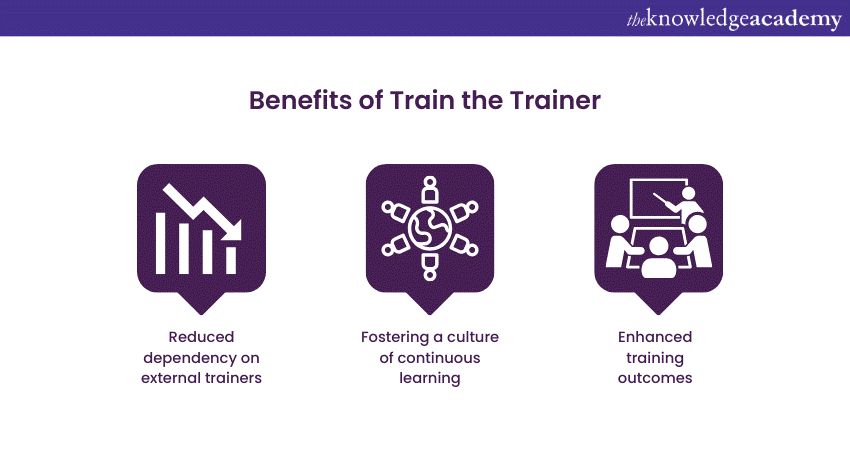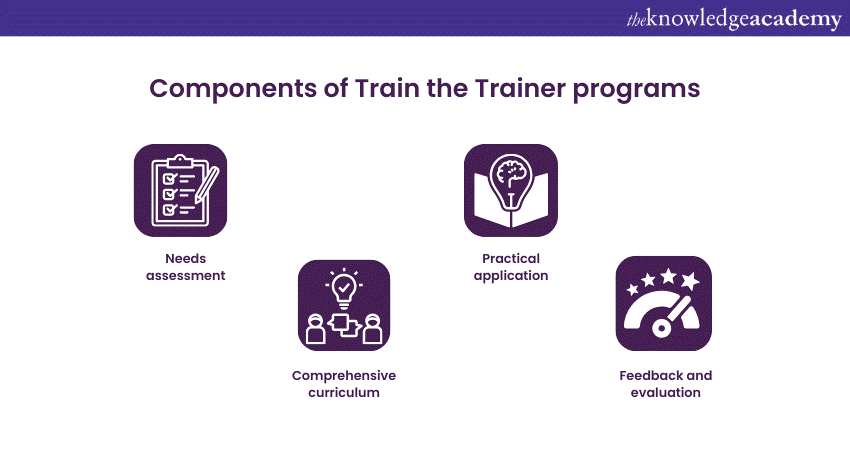We may not have the course you’re looking for. If you enquire or give us a call on +34 932716793 and speak to our training experts, we may still be able to help with your training requirements.
Training Outcomes Within Your Budget!
We ensure quality, budget-alignment, and timely delivery by our expert instructors.

At the heart of effective education lies the transformative concept of "Train the Trainer." But What is Train the Trainer? Train the Trainer is a specialised Training methodology that aims to develop proficient Trainers within an organisation or industry. The process involves equipping these individuals with the necessary skills, methodologies, and knowledge to deliver impactful Training sessions to others. Aspiring Trainers, guided by a Personal Development Coach, learn various aspects, including adult learning principles, instructional design, effective communication, and managing group dynamics. This comprehensive Training empowers organisations to create a sustainable and scalable approach to employee development.
Table of Contents
1) What is Train the Trainer?
2) Importance of Train the Trainer
3) The benefits of Train the Trainer
4) Key components of Train the Trainer programs
5) Implementing Train the Trainer successfully
6) Conclusion
What is Train the Trainer?
In simple terms, it is a specialised approach that empowers educators, instructors, and facilitators to become proficient Trainers. Train the Trainer Best Practices and objectives go beyond subject matter expertise, focusing on enhancing facilitation and instructional abilities. Equipping individuals with such skills fosters a culture of continuous learning and empowers trainers to deliver knowledge and skills to others effectively. The Train the Trainer Objectives is to provide a structured framework for developing and honing the necessary competencies required to deliver impactful training sessions, ensuring that trainers are equipped with the tools and techniques needed to engage learners and facilitate meaningful learning experiences.
What is Train the Trainer model?
The Train the Trainer model follows a structured approach to developing internal trainers with Train the Trainer Skills. It typically involves a needs assessment to identify training gaps, followed by comprehensive programs covering adult learning principles, instructional design, communication, and group dynamics. Hands-on exercises, role-playing, and technology integration are emphasized to provide practical experience. This model reduces reliance on external trainers, saves costs, and enables organizations to cater training sessions to their specific needs and culture, resulting in a skilled and motivated workforce.
Importance of Train the Trainer
The world is changing at an unprecedented pace, and so is the workforce across organisations. Various studies have shown that the shelf life of skills may be as little as five years, which means that employees need to upskill and reskill to stay relevant constantly. Therefore, Train the Trainer programs have become increasingly popular in recent years. These programs aim to equip Trainers and instructional designers with the necessary skills to provide the best learning experience to employees.
Delivering practical Training is much more than putting an individual in front of a classroom to facilitate or explain something. It is an art and a science that involves a process that begins well before the Training course itself and extends beyond its completion.
To ensure the success of a Train-the-Trainer program, selecting the right person to act as the facilitator is crucial. The facilitator must be an expert in content and Design Training and possess experience, patience, and passion. In addition, they must have strong Leadership Skills, exceptional listening skills, and Emotional Intelligence. The role of a Train-the-Trainer facilitator is instrumental in creating a positive impact on employees and achieving the program's desired outcomes.
As Ttrainers, it is essential to possess a firm grasp of the subject matter, excellent interpersonal skills, and a deep knowledge of adult learning principles. Through Train the Trainer workshops, participants can learn various practical Training techniques, best practices, and engaging activities from certified Trainers. These techniques can be used to help Trainees better understand and retain information. In addition to traditional teaching methods, Train the Trainer courses may also cover the latest technological tools and how to incorporate them into Training sessions. This ensures that Trainers have the skills and knowledge to help learners succeed in today's fast-paced world.
Disseminate knowledge and sharpen your active listening skills by signing up for our Train the Trainer Course now!
The benefits of Train the Trainer
Implementing Train the Trainer programs brings forth a plethora of advantages. Some of them are as follows:

Reduced dependency on external Trainers
Implementing Train the Trainer programs offers a significant advantage by diminishing the organisation's reliance on external Trainers. This reduction in external dependencies leads to substantial cost savings over time. Organisations can harness their expertise and knowledge by developing a pool of proficient internal Trainers to conduct in-house Training sessions effectively. This cost-effective approach frees up valuable resources that can be directed towards other critical organisational development and growth areas.
Fostering a culture of continuous learning
Train the Trainer programs are vital in cultivating a culture of continuous learning within the organisation. As employees transition into Trainers, they become knowledge-sharing and collaboration champions. This shift in mindset creates a positive learning environment which encourages and motivates employees to share their expertise, experiences, and best practices with their colleagues. As a result, a rich exchange of ideas occurs, driving innovation and promoting ongoing professional development across the organisation.
Enhanced Training outcomes
Train the Trainer programs contribute to improved training outcomes due to internal trainers' unique advantages. They possess an intimate understanding of the organization's culture and audience, allowing them to contextualize training content effectively. However, it's essential to acknowledge that such programs also come with their own set of advantages and disadvantages. When considering these programs, it's important to evaluate the train the trainer advantages and disadvantages. Internal Trainers can adapt content, methods, and delivery styles to cater to the participants' specific learning styles and challenges. This personalised approach enhances the overall Training experience, leading to better employee knowledge retention and skill application. As a result, organisations can observe increased productivity and proficiency in their workforce.
Get familiarised with effective coaching by signing up for our Coaching Skills Course now!
Key components of Train the Trainer programs

Effective Train the Trainer programs comprise several crucial components. Understanding these key elements ensures a comprehensive and impactful learning experience for Trainers and Trainees.
a) Needs assessment: A thorough needs assessment forms the bedrock of Train the Trainer programs. It involves identifying Training gaps and specific learning objectives within the organisation. This critical step enables customising the program content to address the unique challenges and requirements of the participants, resulting in targeted and relevant Training sessions.
b) Comprehensive curriculum: The program's curriculum should encompass a diverse range of topics. This includes fundamental Training techniques, strategies to handle challenging participants, effective Communication Skills, and technology integration to create engaging and interactive Training sessions.
c) Practical application: Aspiring Trainers benefit from hands-on exercises and role-playing sessions to hone their Training abilities. These practical opportunities allow them to apply their newly acquired skills in a safe environment, gaining confidence and expertise in delivering effective Training.
d) Feedback and evaluation: Continual improvement is a cornerstone of Train the Trainer programs. Feedback and evaluation mechanisms, such as peer assessments and participant surveys, provide valuable insights into Trainers' strengths and areas for growth. This constructive feedback loop ensures that Trainers can adapt and enhance their Training methods to deliver even more impactful sessions in the future.
Ready to level up your skills and unlock your full potential? Enroll now in our Mentoring Training Course and embark on a transformative learning journey!
Implementing Train the Trainer successfully
Implementing Train the Trainer successfully relies on crucial factors. Leadership buy-in sets the tone, emphasising the organisation's commitment to learning. Selecting competent Trainers with subject matter expertise and interpersonal skills is vital. Ongoing support and mentorship bolster new Trainers' confidence and growth. Regularly assessing the program's impact on both Trainers and Trainees identifies areas for improvement, ensuring continuous development and optimising Training capabilities.
Meet the Many Faces of Teaching! Learn about the diverse types of teachers shaping the future.
Conclusion
By now we believe that you’ve understood the answer to “What is Train the Trainer?” Train the Trainer is a powerful approach to strengthen an organisation's training capabilities. By investing in internal talent and fostering a learning culture, companies can reap the benefits of a skilled and motivated workforce. Embracing such programs is a strategic move towards sustainable growth and development.
Ready to enhance your leadership skills? Enroll in our Coaching and Mentoring Training Course today!
Frequently Asked Questions
Upcoming Business Skills Resources Batches & Dates
Date
 Train the Trainer
Train the Trainer
Fri 21st Feb 2025
Fri 25th Apr 2025
Fri 20th Jun 2025
Fri 15th Aug 2025
Fri 17th Oct 2025
Fri 19th Dec 2025







 Top Rated Course
Top Rated Course



 If you wish to make any changes to your course, please
If you wish to make any changes to your course, please


